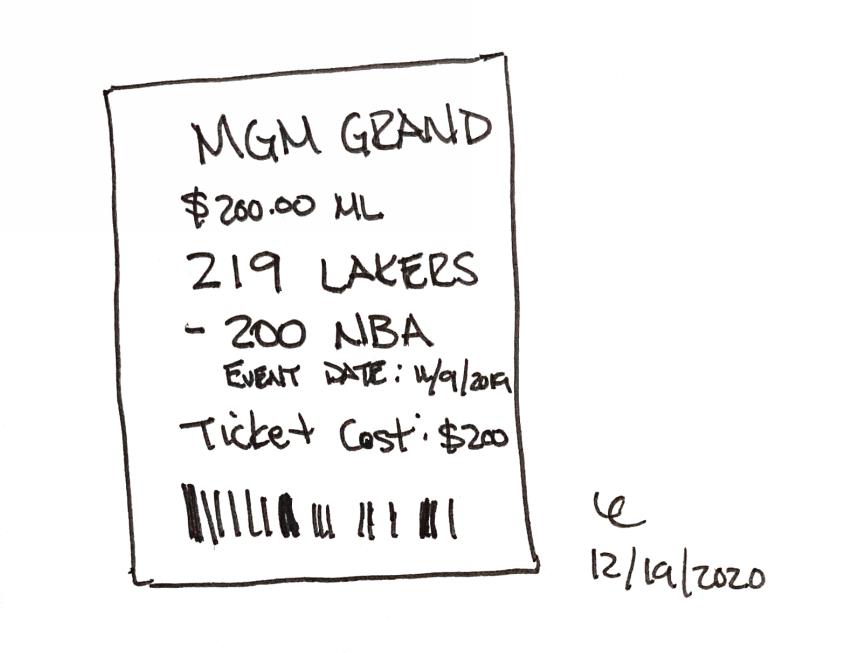Betting Odds

My latest hobby is betting on NFL games. I spent a lot of time watching football games and digging into player news and injuries over the past few months. I figured I can turn that knowledge into profit with sports betting.
I picked up several books on gambling to aid in this pursuit. I’ve found tons of fascinating information, especially with the math involved in gambling. I am going to share what I’ve learned in a series of posts, starting with this one. It’ll be a great way to solidify my reading.
American Odds
The first topic is the odds that sportsbooks offer. Since I reside in US, bets are offered and placed with American odds. These odds are centered around winning or wagering $100 on any given bet. For example, a sportsbook might offer the Los Angeles Lakers at -200 to win their next game. Another bet could be the Kansas City Chiefs at +150 to win the Super Bowl.
Let’s break down what these numbers mean. I’ll start with the negative numbers or what I call minus odds. Minus odds are used when an outcome is favored or more likely to happen. The number shown after the minus sign is what you have to risk to win $100. This means the amount risked is more than the net winnings.
Let’s say I like the Lakers to win their next game at -200 from the example above. I would go to the sportsbook offering that bet and give them $200 for a ticket. If the Lakers win, I will redeem the ticket and receive $300. My net winnings would be $300 minus $200 for $100. I am risking $200 to win $100 at -200 odds.
The bet does not have be $200 but it makes the math easy for this post. I could bet $60 on the Lakers instead of $200. However, if they win, I would receive a net winning of $30 instead of $100.
On the other side, the positive numbers or plus odds indicate an outcome is unlikely or an underdog. The number after the plus sign indicates the amount won per $100 risked. This translates to the net winnings being more than the amount risked.
Once again using the example from above, I want to bet on the Chiefs at +150 to win the Super Bowl. I would go to the sportsbook and hand over $100 for a ticket. If the Chiefs end up winning the championship, I would cash that ticket for $250. My net winnings would be $250 minus $100 for $150. I am risking $100 to win $150 at +150 odds.
However, if the Chiefs do not win, the ticket is worthless and I would have lost $100. The same situation also applies in the Lakers’ example. However, I would have lost $200 in that bet as I paid more for the minus odds.
Implied Odds
There’s more to these minus and plus odds than just conveying the net winnings of a bet. The numbers can also be translated to a probability. This probability can be used to evaluate whether the bet is a good one.
Let’s start with minus odds. Remember, these are favored outcomes, so the probabilities should be higher than 50%. To calculate these probabilities, take the odds and divide it by the odds plus 100. For the -200 Lakers bet, the implied probability is:
200 / (200 + 100) = 200 / 300 = 67%
I would need to believe the Lakers are going to win the game more than 67% of the time if I want to be profitable with that bet. Another way to think about is: if the Lakers played this game 100 times, are they going to win more than 67 times?
The implied odds for plus numbers are calculated with a similar equation. These outcomes are unlikely, so the probability should be less than 50%. To calculate these probabilities, divide 100 by the odds plus 100. For the +150 Chiefs bet, the implied probability is:
100 / (100 + 150) = 100 / 250 = 40%
I would need to trust that the Chiefs win the Super Bowl more than 40% of the time to make money with this bet. Another way to put it is: if the season was played out 100 times, would the Chiefs win it all at least 40 times?
It’s that easy?
As shown in the examples above, understanding the odds and the implied probabilities makes it easier to evaluate a bet. However, you won’t beat the sportsbook with only that information. You’ll need to come up with your own probabilities to compare it with the sportsbook’s lines. And this is hardest part of profitable sports betting.